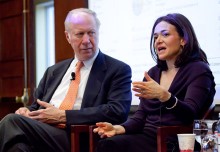
March 9, 2011 — Facebook executives Sheryl Sandberg and Elliot Schrage attracted nearly 200 Kennedy School students to an early-morning discussion on how social media is transforming political organizing, the right to free speech, and corporate social responsibility. With social networks arguably playing as significant a role in revolutionary movements in the Middle East as Gutenberg’s printing press played in the Protestant Reformation, Sandberg and Schrage’s visit couldn’t have been timelier.
This first event in the Center for Public Leadership’s (CPL) “Leading Through the Internet” series was cosponsored by the Shorenstein Center on the Press, Politics, and Public Policy. CPL Director David Gergen and Shorenstein Director Alex Jones served as comoderators.
Sandberg (’91, M.B.A. ’95) and Schrage (’81, M.P.P. ’86, J.D. ’86) joined Facebook from Google where Sandberg saw the goal as “indexing the world’s information,” as opposed to Facebook where “technology was going to empower us as individuals.” A potentially shifting paradigm from ‘the information web’ to ‘the social web’.
Having recently celebrated its 7th anniversary, Facebook now boasts more than 500 million active users. Some governments around the world have reacted to the power of its platform: Facebook has been intermittently or permanently blocked in countries such as Iran, Pakistan, China, Bangladesh, and North Korea, according to data from the Open Net Initiative. Syria, Schrage pointed out, which had banned the site, recently lifted its filter.
Sandberg was quick to note that Facebook’s role in such sensitive international affairs is to provide a secure place for people to share, while being mindful of the laws of each country in which it operates. “[Facebook] does not—and should not—have a foreign policy,” added Schrage. “The purpose of social media is not to create revolutions but to enlarge a public space that didn’t exist before. Ninety-nine percent of the time, this is not threatening to governments. …By expanding that sphere you increase discourse on democracy and accountability.”
“To the extent that we have a point of view,” Sandberg continued, “we are for individual voice. We want individuals to be able to connect and share anywhere in the world.”
But that doesn’t mean that Facebook takes an activist stance in lobbying on behalf of oppressed social movements. Rather, it acts in accordance with its organizational mission of enabling people to connect. In Tunisia, for example, where, following a security breach, Facebook required users to change their passwords upon entering the site. Such action was good for business, but it also helped the leaders of the pro-democracy movement keep their private communications from government officials.
The company takes a broad view of free speech, Sandberg explained. “We take pornography off our site. We take real hate and violence off. But at the same time, we allow people to deny the Holocaust” except in countries such as France and Germany, where laws against hate speech prohibit access to sites that deny the Holocaust.
Sandberg ended her remarks by reiterating a message she shared at last year’s TED conference: women’s underrepresentation in leadership positions throughout all sectors. More women need to “sit at the table …both literally and figuratively,” she said. However, until a more equitable division of domestic responsibilities occurs, “we are not on track for the situation to be any better for my children’s generation.” It is important to help young women develop the confidence to put themselves forward when leadership opportunities arise, Sandberg continued. Otherwise, “If you don’t think you deserve the credit for what got accomplished, how do you raise your hand and keep it up?”
The audience erupted in applause, presumably as much for what she said as for what she, herself, has accomplished.
Future “Leading Through the Internet” events and workshops will tackle many of the challenges and opportunities that leaders face in the digital age, including strategy, application, and innovation.
This article was written by Patrick McKiernan, Center for Public Leadership. Photos were taken by Tom Fitzsimmons.

